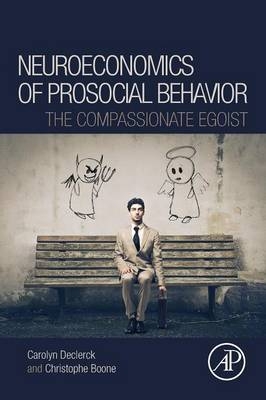
Neuroeconomics of Prosocial Behavior
Academic Press Inc (Verlag)
978-0-12-801303-8 (ISBN)
The book will further explore individual differences in prosocial behavior, the development of prosocial behavior, and how a personal neural signature forms that facilitates or hampers cooperation. The book includes game theory research, neuroimaging studies, and research in traditional cognitive psychology to better understand human decision-making re prosocial behavior. This will be of interest to cognitive, developmental, and social psychologists, as well as neuroscientists, and behavioral economists.
Carolyn Declerck is currently a professor at the Department of Economic Sciences at the University of Antwerp where she teaches psychology and conducts research on cooperation and social dilemmas. C. Declerck obtained her PhD in Ecology at the University of California Davis (1991) and subsequently taught various classes in ecology and biodiversity at Portland State University, Oregon (1992-1998). She conducted post-doctoral research in the neuroscience of choice behavior and economic decision making at the University of Antwerp (1999-2006) and joined the Faculty there in 2006. Together with Christophe Boone they started a research program in neuroeconomics where they and their graduate students combine principles of psychology, behavioral economics, and the tools of neurosciences to try to unravel the different motives underlying social decision-making. Carolyn Declerck is also the author of a Dutch book (Who is the Homo economics?, Leuven: ACCO Press) with the purpose of introducing the principles of psychology to undergraduate students in Economic Sciences. Christophe Boone is a full professor of Organization Theory and Behavior at the Faculty of Applied Economics of the University of Antwerp (Belgium). Before that he was full-time faculty at the Graduate School of Business and Economics (GSBE) of Maastricht University, The Netherlands (1992-2001). He held a honorary chair in Organization Theory at the University of Groningen (2005-2006). Recently, he was nominated as a fellow extra muros at the GSBE of Maastricht University (2014-2017). He is co-founder of the Antwerp Centre of Evolutionary demography (ACED), an international and interdisciplinary research institute established at the University of Antwerp in 2007 dedicated to the study of the antecedents and consequences of diversity in the realm of teams, organizations, industries and communities. Christophe Boone is an interdisciplinary social scientist with research interests that currently focus on the dynamics of organizational populations in local communities, the antecedents and consequences of team and organizational diversity, CEO values and cognition, and the neuroeconomics of decision making.
Chapter 1 - Two Routes to CooperationChapter 2 - The Neuroanatomy of Prosocial Decision Making: The Role of Valuation, Cognitive Control and Social CognitionChapter 3 - Neurochemistry of Prosocial Decision Making: The Role of Dopamine, Serotonin, and OxytocinChapter 4 - Individual Differences in Prosocial Decision Making: Social Values as a CompassChapter 5 - Beyond Parochialism: Cooperation Across the Globe
| Verlagsort | San Diego |
|---|---|
| Sprache | englisch |
| Maße | 152 x 229 mm |
| Gewicht | 320 g |
| Themenwelt | Geisteswissenschaften ► Psychologie ► Entwicklungspsychologie |
| Geisteswissenschaften ► Psychologie ► Familien- / Systemische Therapie | |
| Geisteswissenschaften ► Psychologie ► Sozialpsychologie | |
| ISBN-10 | 0-12-801303-6 / 0128013036 |
| ISBN-13 | 978-0-12-801303-8 / 9780128013038 |
| Zustand | Neuware |
| Haben Sie eine Frage zum Produkt? |
aus dem Bereich


